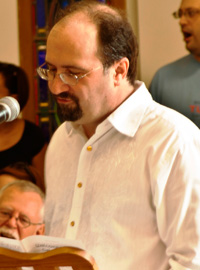Rev. Dr. Steven Tomlinson Hope Awards Keynote Addr
April 23rd, 2024
“Do you expect to be made perfect in love in this life?” What kind of fool would say yes to such a question? Well, any fool hoping to be ordained in the United Methodist Church, that’s who. Thirty three years ago I stood in a full room and answered yes to this question asked by my presiding bishop.
It was a question I knew all too well and a question that Methodism’s founder, John Wesley, asked of both lay and clergy members in the 18th Century movement of Methodism. When I answered in the affirmative, I also knew that what Wesley meant by perfection was very different than my own cultural attachments to that word. Sadly, over the years I have still given more authority to my cultural beliefs around perfection than my learned Wesleyan theology. I’m better at it now than I was 30 years ago, but the journey of remythologizing is still incomplete.
 On Tuesday evening, September 23rd, iACT’s Red Bench dialogue session, held at my congregation of Trinity UMC, will be asking us to ponder the meaning of perfection in our own lives and within our various religious contexts. Because it is an issue in our culture in general, perfection is a constant red flag in our religious contexts regardless of the historical teachings of our particular traditions, whether we are Methodist, Wiccan, Muslim, Unitarian, or anything else.
On Tuesday evening, September 23rd, iACT’s Red Bench dialogue session, held at my congregation of Trinity UMC, will be asking us to ponder the meaning of perfection in our own lives and within our various religious contexts. Because it is an issue in our culture in general, perfection is a constant red flag in our religious contexts regardless of the historical teachings of our particular traditions, whether we are Methodist, Wiccan, Muslim, Unitarian, or anything else.
Since my own mythological framework is Christianity, I will point out two references in the New Testament. The first is Jesus’s statement in Matthew 5:48, which reads “Be perfect, therefore as God is perfect.” The second comes in the midst of the Apostle Paul’s famous love poem in 1 Corinthians, which reads, “but when the perfect comes, the partial will come to an end.” Neither citation has anything to do with perfection in our common cultural framework.
On July 19, 1692, Susannah Martin, one of my direct ancestors (my 7th time great grandmother) was hanged as a witch in Salem based on false accusation from a circle of girls and her neighbor. She was a 67 year old widow, mother, and grandmother, daughter of a Puritan deacon, and a devoted Christian. The perfectionism that came to represent the cornerstone of Puritanism, a religious sentiment to which she herself was committed, came back to kill her, as this kind of “us and them” perfectionism often does. In my own life—a life enveloped in the core Wesleyan theology of grace—I have struggled to free myself of culturally learned shame-based religious undertones of “measuring up.”
John Wesley wrote that, “By ‘perfection’ I mean ‘perfect love,’ or the loving of God with all our heart, so as to rejoice evermore, to pray without ceasing and everything to give to give thanks.” Furthermore, Wesley believed perfect love could be attained in this lifetime.
Wesley, Jesus, the Buddha, Starhawk, and most of our mystic-prophets from every tradition through the ages, would be the first ones to redirect us into a grace-filled, remythologized understanding of perfection. We are so pre-occupied with attaining perfection, reaching out into the distance for some precise point of morality or religious achievement, that we dismiss the present moment in all its beauty. Sadly, perfection—specifically, the feeling that we lack perfection—becomes the reason for the awful things that happen in our lives; because we somehow “failed.” We see ourselves as failures if we don’t pray enough, diet enough, have solar panels on our house, etc. This kind of perfectionism must surely do more damage to our psyches, bodies, and planet than any ‘healthy” or “religious” program to which we can align ourselves.
I believe we are called to embrace our brothers and sisters who are of a different faith, give up on the addiction to perfection as rigidity and adopt perfection as wholeness or perfect love, and recognize that people different from us are just as human and are on their own unique and beautiful paths to fulfillment.
Sam Keen writes, “We come to love not by finding a perfect person but by learning to see an imperfect person perfectly.” In this model of “the perfect,” there is room enough for all.
written by Rev. Dr. Sid Hall, III, Senior Minister, Trinity United Methodist Church-Austin